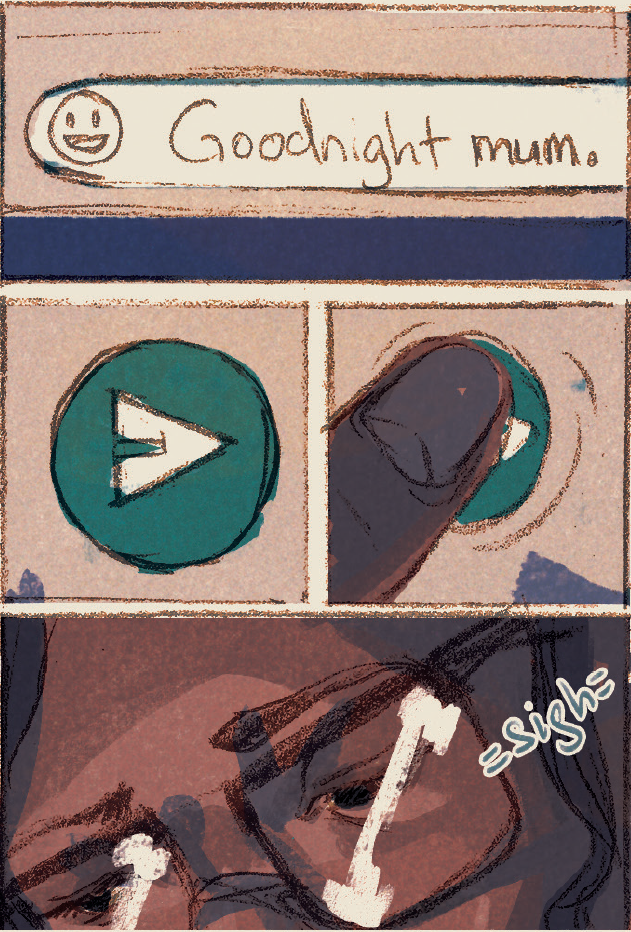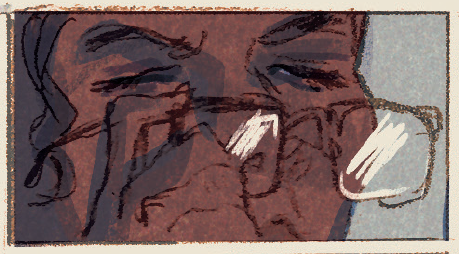Neng Amor Neng Sabor (No Love, No Taste)
Andre D'Rozario, Gerald Choa and Shane Carroll.
Colours by Griselda Gabriele.
Thank goodness Godma called out to me from the crowd. It was pretty loud for a wake.
I felt this odd mix of safety and unease seeing people who look like me, and people who could be my family, but whom I don't know personally. I think I saw my cousins? I thought it would be awkward to say hi, since the last time we played together was in primary school. Godma has grey hair now. All of them do actually; they look so much older. They were talking in a way I hadn’t heard in a long time, and yet felt comfortably familiar. I started to feel like I fit in; like I was meant to be here.
*24. Swine! You don’t misbehave ah.
“Bos … nang … rayu …” Don’t be a rascal. Although I guess when they say that, it means more like “Don’t anyhow”, when we’re speaking Singlish. Hah, not that I think it’s possible for Uncle Jerry to follow that advice. He is like, Peak Rayu. Rayu, doda (silly girl), fedeh (smelly), babu (saliva). We heard all these words growing up and thought Mum and Dad were saying silly words in Malay to scold us. I can’t believe I still remember. When Godma said “rayu” tonight it was like I was transported back in time—to times I tried to climb up playground slides, to times when I would sit on the edge of a rattan chair trying to balance my weight. And then, when I fell and landed on my ass—“Ah! Doda. Doda.”—that familiar refrain would escape Mum’s mouth in a mutter.
They never taught me any other words though. “Gossip language”, as Uncle Felix described it. Maybe that’s why. Mum hated gossip, rumours, how news travelled faster than she could blink. Always wanted us to talk proper and be taken seriously. That’s what happens when your mum is a teacher I guess.
But I kinda wish they did. Hearing everyone around me speak Kristang was truly something else. It seemed like the fun language: like they can’t help but smile and laugh when using it—English for when they’re serious, Kristang for when they’re having a good time.
I think it’s so cool that it sounds like they’re code switching between Malay words and words that ‘sound’ Portuguese but are not quite. It sounds like switching to me, but maybe to them it’s all just a blend; a natural way of speaking. Of course, learning Kristang was never an option at school, and Mum and Dad pushed me to pick up Mandarin instead, thinking it was the most practical option to be fluent in—but now I’m just stupid in two languages.
*25. Where did you go.
*26. A drop of oil, and a pinch of salt...
*27. If you know [how to do something], you won’t know where to run.
[Idiom: People will start asking things of you when you have a certain know-how]
It’s so cool that they’ve kept all these photos for so long. How are they still so sharp? Godma says it’s because they haven't seen the light of day in a long time. I need to find a day to scan all of these digitally. I can’t believe Uncle Gerard is as scrawny as he was back then.
Seeing all the uncles and aunties so young is so surreal. The batu giling … I don’t recall many memories of Auntie Minnie, I only ever went to her house when I was a small kid—but somehow I remember how much she sweated and grunted and toiled just to grind the chillies for her spice mix. Her rempah. I remember Mum being worried, asking her why not just use the blender now, it’s the 21st century, but Auntie Minnie said that the flavour wouldn’t be the same. They’ve told me that, when they shared recipes with people outside the family, they would leave out one ingredient just so they didn’t give away all their secrets. Only the family could know the full recipe.
*28. Thank you Godma!
*29. Thank you Auntie Minnie!
*30. No worries, dears! Come and eat, don’t be shy!
*31. Oh dear...
*32. Rockstar? How to become a rockstar...
*33. Neither love, nor taste.
Looks like teatime is something that Auntie Minnie made sure to happen, as if by clockwork, even all those years ago … it was 3pm sharp even back then, huh? No wonder Mum insisted that we break out the china during weekends at Nan’s while she was still around. At 3pm. Sharp. Nan always brought out the best cakes and pastries. I remember the pillowy pandan cake her neighbour baked, and the warm spiced kek lapis only she could make. Mum (and I) could never—the patience it takes to bake each new layer, again and again, was clearly not inherited.
And I guess, because of this ritual, I`d need a cup of tea around three, be it teh tarik or a Starbucks earl grey. I mean yeah, sure, other people obviously take afternoon breaks, but for us it’s so regular and even necessary. It’s funny—Mum didn’t really pass down any other Eurasian traditions, but I guess she wasn’t aware that she was continuing this one because it was second nature to her. Maybe some traditions have a greater chance of survival than others, and this is one of them.
Despite the regular 3pm cups of tea when I’m by myself, I can never find a good enough cake to make it feel complete. It’s what Auntie Judith said: Eurasians always think their version of sugee cake is superior … and I’ll always feel like Mum’s is the best. The warmest, and the most comforting. “Neng amor neng sabor”—without love, there’s no taste. They tell me that’s what Auntie Minnie used to say; it's why she insisted on using the batu giling instead of a blender.
Taste in tea … taste in food … even taste in music. Auntie Minnie rocking out at a gig in a bar? That’s actually so cool. My memory is being jogged again … Mum and Dad used to host parties when we all still lived together, and everyone would jam out. I never thought about it this way, but maybe the rhythm I beat my drums to when I’m stressed … maybe that’s where it came from. Maybe I’m not as removed from my family’s culture as I thought.
*34. Look at all this! I planted this banana tree when we first came to stay in this neighbourhood...
*35. Sayang, fetch me my hat.
Sayang = term of affection in Malay (e.g. darling, sweetheart)
*36. malay: Explode / Pop
You know, I’ve always wondered why we have pineapples in so many things. Curry, tarts … luckily Godma knows a lot about food. She told me that this is a slice of influence that made its way to our plates from places like Sri Lanka.
I had a classmate with the surname De Silva. FINALLY, someone else with a “D” or “De” in their surname. For the longest time I thought she was Eurasian as well, and I wasn’t the only one. It wasn’t until my friends and I were invited over for dinner that we found out she is Sri Lankan. I tried something that tasted like sugee cake, and her mum also put pineapples in the curry she made. It was as if I was at Nan’s house … I didn’t realise how much I missed her until that dinner. I could do with some sugee cake.
There are links though; they are not incidental. Both Sri Lanka and Malacca used to be Portuguese colonies. People must have gone back and forth, trading food and stories … I wonder if the Sri Lankans have a language like Kristang too.
Almost all my thoughts keep orbiting around food, but it’s hard not to when so much of what we talked about today was just that. Everyone seems to find a way to chime in, with their own stories and opinions. Uncle Felix tells me that belacan, cincalok, all these spicy prawn things … these all come from Malacca, and are a reminder that the community used to be made up of fishermen. Gragok—I thought that was a slur at first. It’s like people can’t help but emit a low growl when they say it, but it just means ‘shrimp’ in Kristang. But it’s also a colloquialism for ‘Eurasian’? We’re like … shrimp people? What the hell. It makes no sense. Isn’t that racist?
Seeing a young picture of mum was rather weird. I haven’t seen many of her as a child; I actually thought the photo of her was of me, and I had forgotten. She wasn’t kidding about her being drafted into a tart-making factory as a child. It isn’t considered child labour if you’re not paid I guess. Come to think of it, this is the first Christmas without tarts. Why didn’t I ever join Mum and Auntie Minnie to bake them? Their tarts were the best, just the right balance of ingredients—the worst is when you get those ones which are just balls of jam rolling off the pastry, a choking hazard really.
Pineapple tarts are another thing I’ve taken for granted. They’re obviously not exclusively Eurasian—I mean, they’re everywhere, I’ve eaten them at so many of my friends’ houses during their own cultural festivities, be it with Chinese friends during Lunar New Year, with Malay friends during Hari Raya Puasa, and with Indian friends at Deepavali. It’s funny how we share the same treat, but it all means something slightly different to each of us. I guess if pineapples first came to us from trade, maybe the recipe did too—we don’t have much else in our cuisine that resembles Western pastries so closely. Like those shortbread cookies that come in blue tins which seemingly every grandmother around the world would pack their sewing tools in but leave out to trick us. And so everyone then wanted in, and each had their own take on it. It’s pretty cool, really.
Ha, look, I just did a quick Google search, pulling up lots of websites that mention all the other communities, even some how-to-videos about pineapple tarts from big American content farms, but no mention of it being a Eurasian thing, or how it’s a Christmas tradition for us. That’s what’s unique about our tarts. But nope, no mention. Ugh. Here’s to feeling, I don’t know … invisible again.
It's odd to feel all this frustration now, feeling so immediately connected to something I didn't know existed until tonight. I`m kind of excited to see my family again tomorrow. But I hope I don't have to talk to the scary woman mum walked in with at the end…
With an interest in art, illustration and storytelling, Andre D’Rozario hopes to bring Eurasian culture and stories to life in his projects. He led the productions of both Ki Sorti and Ila-Ila di Sul (The Southern Islands), the first bilingual English-Kristang board game. Having just completed his BA in Psychology, he hopes to become a clinician. He is currently learning to sew from his grandmother.
Shane Carroll writes for both work and play. By day he’s a copywriter specialising in digital and social media marketing. By night he’s a poet, punster, and everything in between. He is the co-author of Ki Sorti and author of Stories by the River, a poetry collection set around the Singapore River.
An associate at a consulting firm specialising in cultural insights and brand strategy, Gerald Choa brings his experience in the field of Linguistics to work with both the Kristang and Baba Malay communities to help preserve their languages. He is a co-author of Ki Sorti and hopes to continue producing stories with the purpose of language preservation and revitalisation.















